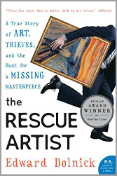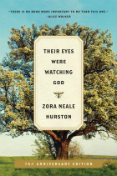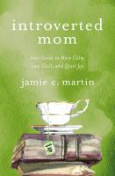 I really enjoyed “The Rescue Artist,” which I read for the 2019 Book Riot Read Harder Challenge book of non-violent true crime. The story of the theft of Edvard Munch’s “The Scream” from Norway’s National Gallery in Oslo in 1994 (the same morning the Olympics started in Lillehammer) is the through-line of the story, as well as profiling Scotland Yard Art Squad detective Charley Hill, who eventually recovered the painting. The story meanders into major art thefts and art thieves in history, how those cases were often worked (or not), Munch and his works, museum security and more. I actually liked how it wandered around topics, always coming back to “The Scream” and Charley Hill. It’s how my brain works, but might be annoying to some who like a straight-line story.
I really enjoyed “The Rescue Artist,” which I read for the 2019 Book Riot Read Harder Challenge book of non-violent true crime. The story of the theft of Edvard Munch’s “The Scream” from Norway’s National Gallery in Oslo in 1994 (the same morning the Olympics started in Lillehammer) is the through-line of the story, as well as profiling Scotland Yard Art Squad detective Charley Hill, who eventually recovered the painting. The story meanders into major art thefts and art thieves in history, how those cases were often worked (or not), Munch and his works, museum security and more. I actually liked how it wandered around topics, always coming back to “The Scream” and Charley Hill. It’s how my brain works, but might be annoying to some who like a straight-line story.
However, in a classic case of judging a book by its cover, I first saw the paperback version of this title at a bookstore, which drew my eye with its brightness and the dynamic illustration on the cover, plus the pull-out quote about it being fast-paced, rollicking and beautifully written. Then I realized it would work for one of the Read Harder challenges, so I requested it from the library, which only had the hardback with a much less interesting cover! So even though I was enjoying it when I read, and it was pretty fast-paced and well-written, etc., I found myself loath to pick it up because the cover turned me off so much! So, it took longer than it should have, but I’m glad I finished it.
Three words that describe this book: art theft investigation
You might want to pick this book up if: You enjoy art, true crime written with some humor, detective work, or mysteries.
-Debbie
Task number 19 of this year’s Read Harder Challenge has participants reading a book of nonviolent true crime. Titles under this heading include stories of forgeries and thefts carried out by individuals, as well as accounts of large-scale malfeasance committed by multi-national corporations.
 “Can You Ever Forgive Me?” is a memoir by literary forger Lee Israel. Melissa McCarthy starred in the movie version. Israel was a highly-esteemed author, earning top dollar for her work. But as she entered middle age, one big publication flop marked the beginning of the end of her literary career. Desperate for an income, she turned to forging letters, purportedly by famous authors of the past. The book is a quick read and focuses a lot on the process of creating the forgeries, which involved a ton of research, it turns out. While the author takes full responsibility for her own behavior, her account also sheds a light on some the unsavory parts of both publishing and autograph collecting, as well as our culture of celebrity. Continue reading “Read Harder 2019: A Book of Nonviolent True Crime”
“Can You Ever Forgive Me?” is a memoir by literary forger Lee Israel. Melissa McCarthy starred in the movie version. Israel was a highly-esteemed author, earning top dollar for her work. But as she entered middle age, one big publication flop marked the beginning of the end of her literary career. Desperate for an income, she turned to forging letters, purportedly by famous authors of the past. The book is a quick read and focuses a lot on the process of creating the forgeries, which involved a ton of research, it turns out. While the author takes full responsibility for her own behavior, her account also sheds a light on some the unsavory parts of both publishing and autograph collecting, as well as our culture of celebrity. Continue reading “Read Harder 2019: A Book of Nonviolent True Crime”
It’s always a good thing when people attempt to understand each other. The 2019 Read Harder Challenge is here to nudge us along in this pursuit with task number 13, a book by or about someone that identifies as neurodiverse.
 Temple Grandin is an animal scientist and perhaps the country’s most well-known author with autism. She’s spent decades educating the public on both issues. Her book, “Animals Make Us Human” is the product of 30 years of research into how to help animals live their best lives. She covers pets, zoo animals and livestock, with an eye to meeting their needs in a compassionate way, rather than prioritizing human entertainment. The book contains some disturbing facts about factory farms and other settings, but also offers ways to improve. Continue reading “Read Harder 2019: A Book by or About Someone That Identifies as Neurodiverse”
Temple Grandin is an animal scientist and perhaps the country’s most well-known author with autism. She’s spent decades educating the public on both issues. Her book, “Animals Make Us Human” is the product of 30 years of research into how to help animals live their best lives. She covers pets, zoo animals and livestock, with an eye to meeting their needs in a compassionate way, rather than prioritizing human entertainment. The book contains some disturbing facts about factory farms and other settings, but also offers ways to improve. Continue reading “Read Harder 2019: A Book by or About Someone That Identifies as Neurodiverse”
 Hurston’s 1937 novel “Their Eyes Were Watching God” is a classic work, and it contributed to the Harlem Renaissance. The novel follows the romantic life of Janie, who searches for a lasting love throughout her life. Janie marries three times and each of her relationships is unique, with none of her three husbands meeting her expectations or needs, but all in different ways. Janie is stubborn and determined, but faces expectations from her husbands and society in general to be more subservient to her men, something she wrestles with and even rebels against. The novel also explores African American life and culture in the early to mid-twentieth century. The setting of Eatonville, Florida, is based on Hurston’s own upbringing in this African American town. Eatonville was — and is — unique because it was a haven for African Americans in an era of segregation and white supremacy. Hurston also uses heavy dialect throughout the novel, which can be hard to read, but reflects her desire to highlight African American language and culture. The Harlem Renaissance is still often remembered as a time in which African American men flourished artistically, but Hurston’s work reminds us that African American women contributed to the arts as well.
Hurston’s 1937 novel “Their Eyes Were Watching God” is a classic work, and it contributed to the Harlem Renaissance. The novel follows the romantic life of Janie, who searches for a lasting love throughout her life. Janie marries three times and each of her relationships is unique, with none of her three husbands meeting her expectations or needs, but all in different ways. Janie is stubborn and determined, but faces expectations from her husbands and society in general to be more subservient to her men, something she wrestles with and even rebels against. The novel also explores African American life and culture in the early to mid-twentieth century. The setting of Eatonville, Florida, is based on Hurston’s own upbringing in this African American town. Eatonville was — and is — unique because it was a haven for African Americans in an era of segregation and white supremacy. Hurston also uses heavy dialect throughout the novel, which can be hard to read, but reflects her desire to highlight African American language and culture. The Harlem Renaissance is still often remembered as a time in which African American men flourished artistically, but Hurston’s work reminds us that African American women contributed to the arts as well.
Three words that describe this book: Historic, romance, African American culture
You might want to pick this book up if: You enjoy classic literature, especially from African American and/or women writers
-Anonymous

Films that center around money and finance can sometimes be boring and slow paced — usually there isn’t much action to show. But some films involving finance can be exciting in the hands of a gifted filmmaker who finds compelling subjects to interview. Check out these documentaries involving finance. Continue reading “On The Money: Docs Involving Finance”

There is a fifth dimension beyond that which is known to man. It is a dimension as vast as space and as timeless as infinity. It is the middle ground between light and shadow, between science and superstition, and it lies between the pit of man’s fears and the summit of his knowledge. This is the dimension of imagination. It is an area which we call the Twilight Zone.
— Season 1 opening narration
We’re two weeks out from the close of Summer Reading, and the procrastinators among us may have just one or two tasks to complete before they can take that victory lap. In honor of both the 60th anniversary of the premiere and Jordan Peele‘s new reboot, here are a few ideas to take your Summer Reading into the fifth dimension, because who doesn’t appreciate a timely theme? Continue reading “Summer Reading in The Twilight Zone”

This is the second post celebrating the 50th anniversary of a big event to happen in 1969. I’m sharing some books and DVDs that focus on the Apollo 11 moon landing that happened on July 20, 1969. There are even more library materials on this topic than the few I’ve listed below. Check out this list for more suggestions!
On July 16, 1969 the Apollo 11 spacecraft, manned by Neil Armstrong, Michael Collins and Buzz Aldrin, launched from the Kennedy Space Center Launch Complex. Apollo 11 landed on the moon four days later July 20, 1969. This was the first mission to land men on the moon and the first return of samples from another planetary body. Continue reading “50th Anniversary: Apollo 11 Moon Landing”
 “Introverted Mom” was not only informational, on the topic of motherhood and introversion, but was also inspirational. Not only was it humorous and insightful, it opened my eyes to my own particular challenges and how to view them as gifts instead of burdens. Her encouragement and tips have given me fuel to embrace my introversion and taught me how to better meet my own needs so I can meet the needs of those who need me. I also enjoyed her look into the lives of some of my favorite women authors (Austen, Montgomery, Alcott) who were also purportedly introverted as well, and how they navigated their social and familial worlds with their special gifts. This is a book I will read and reread with pleasure, likely garnering new tidbits each time.
“Introverted Mom” was not only informational, on the topic of motherhood and introversion, but was also inspirational. Not only was it humorous and insightful, it opened my eyes to my own particular challenges and how to view them as gifts instead of burdens. Her encouragement and tips have given me fuel to embrace my introversion and taught me how to better meet my own needs so I can meet the needs of those who need me. I also enjoyed her look into the lives of some of my favorite women authors (Austen, Montgomery, Alcott) who were also purportedly introverted as well, and how they navigated their social and familial worlds with their special gifts. This is a book I will read and reread with pleasure, likely garnering new tidbits each time.
Three words that describe this book: Encouraging, humorous, insightful.
You might want to pick this book up if: You are a mom, a homeschooler, an introvert, or any combination of the the above, or know someone who is. In fact, I would suggest this would be a good read for husbands, whether introverted or extroverted, in understanding their introverted spouses better. Very easy to read and enjoyable!
-Anonymous
Another month, another crop of exciting new books by debut authors! As always, for a longer list of books by debut authors, please visit our catalog.
 “The Vexations” by Caitlin Horrocks
“The Vexations” by Caitlin Horrocks
Erik Satie begins life with every possible advantage. But after the dual blows of his mother’s early death and his father’s breakdown upend his childhood, Erik and his younger siblings — Louise and Conrad — are scattered. Later, as an ambitious young composer, Erik flings himself into the Parisian art scene, aiming for greatness but achieving only notoriety.
As the years, then decades, pass, he alienates those in his circle as often as he inspires them, lashing out at friends and lovers like Claude Debussy and Suzanne Valadon. Only Louise and Conrad are steadfast allies. Together they strive to maintain their faith in their brother’s talent and hold fast the badly frayed threads of family. But in a journey that will take her from Normandy to Paris to Argentina, Louise is rocked by a severe loss that ultimately forces her into a reckoning with how Erik — obsessed with his art and hungry for fame — will never be the brother she’s wished for. Continue reading “Debut Author Spotlight: July 2019”
“The Incendiaries” by R.O. Kwon has already scored a bunch of plaudits, and, you might presume, that it, like many of my recommendations, isn’t in need of my recommendation. You’d be correct, but there is a devoted sect who wait for my monthly recommendation, refusing to read all else, waiting in front of the DBRL blog home page, their finger’s friction eroding their F5 key, until finally those sweet words light up the page and their eyes: “The Gentleman Recommends.” It is for these devoted followers that I recommend reading “The Incendiaries.” Continue reading “The Gentleman Recommends: R.O. Kwon”
 I really enjoyed “The Rescue Artist,” which I read for the 2019 Book Riot Read Harder Challenge book of non-violent true crime. The story of the theft of Edvard Munch’s “The Scream” from Norway’s National Gallery in Oslo in 1994 (the same morning the Olympics started in Lillehammer) is the through-line of the story, as well as profiling Scotland Yard Art Squad detective Charley Hill, who eventually recovered the painting. The story meanders into major art thefts and art thieves in history, how those cases were often worked (or not), Munch and his works, museum security and more. I actually liked how it wandered around topics, always coming back to “The Scream” and Charley Hill. It’s how my brain works, but might be annoying to some who like a straight-line story.
I really enjoyed “The Rescue Artist,” which I read for the 2019 Book Riot Read Harder Challenge book of non-violent true crime. The story of the theft of Edvard Munch’s “The Scream” from Norway’s National Gallery in Oslo in 1994 (the same morning the Olympics started in Lillehammer) is the through-line of the story, as well as profiling Scotland Yard Art Squad detective Charley Hill, who eventually recovered the painting. The story meanders into major art thefts and art thieves in history, how those cases were often worked (or not), Munch and his works, museum security and more. I actually liked how it wandered around topics, always coming back to “The Scream” and Charley Hill. It’s how my brain works, but might be annoying to some who like a straight-line story.






